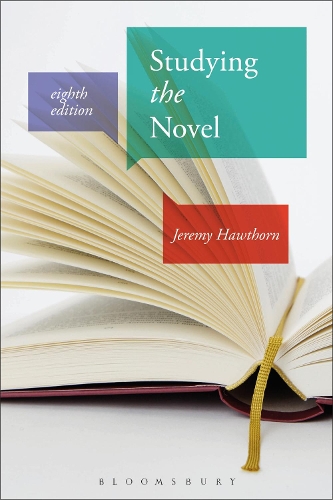
Studying the Novel
(Paperback, 8th edition)
Available Formats
Paperback, 8th edition
Published: 17th November 2022
Hardback, 8th edition
Published: 17th November 2022
Hardback, 7th edition
Published: 15th December 2016
Paperback, 7th edition
Published: 3rd November 2016
Publishing Details
Studying the Novel
By (Author) Professor Jeremy Hawthorn
Bloomsbury Publishing PLC
Bloomsbury Academic
17th November 2022
8th edition
United Kingdom
Classifications
Tertiary Education
Non Fiction
Literary theory
808.3
Physical Properties
Paperback
312
Width 170mm, Height 244mm, Spine 20mm
560g
Description
Consistently praised for its readability and scholarship, Studying the Novel is the ideal undergraduate companion to the study of the novel and shorter fiction. Revised throughout to reflect the profound impact of e-reading and digital resources on the writing, reading, and analysis of fiction, the eighth edition includes a new chapter on popular fiction that covers childrens fiction, horror and the gothic, science fiction, the detective story, the comic novel, and the graphic novel. The chapter on World Literature has been expanded to include sections on fiction and apartheid, and the fiction of disability, and information on electronic resources has been thoroughly updated. Providing a complete guide to the study of prose fiction in one reader-friendly volume, the book covers: - The history and diversity of the novel, from early ancestors to new electronic forms - The novel, the novella, and the short story - Realism, modernism, and postmodernism - Analysing fiction: narrators, character, structure, theme, and dialogue - Popular fiction - Critical approaches to studying the novel - Practical guidance on textual analysis, the choice and use of criticism, electronic resources, and essay writing - Film and TV adaptations, and reading novels in translation - World literature Comprehensive cross-referencing allows readers to locate information quickly. Technical terms and concepts such as perspective and voice, symbol and image, Free Indirect Discourse, and many others are all explained with the help of examples from a wide range of fictional works. A Glossary provides additional explanations of terms and concepts the student is likely to encounter, and each chapter concludes with a set of study questions.
Reviews
This new edition of Studying the Novel is markedly the product of a life time of teaching and sustained reflection on the novel. It takes the reader from the basics of character, action, plot through to recent developments in critical approaches to the novel narratological, textual, contextual, ideological; and from the ancestors of the novel through to world literature via computer games, interactive fiction and hypertext fiction. For this new edition, Hawthorn has added a new chapter on popular fiction (including childrens fiction and the graphic novel) and new sections on the novel and disability and the novel and apartheid. Studying the Novel is written with Hawthorns usual clarity and intelligence: it manages to provide helpful guidance for those just starting into the serious study of the novel (including How to take Notes and Using Critics), while remaining constantly thought-provoking for the more experienced student of fiction. It is appropriately aware of its own imagined reader, and richly furnished with a range of illustrative fictional examples. It is essential reading for anybody setting out to think critically about the novel, and the topics for discussion after each chapter make this a very useful teaching tool. * Robert Hampson, University of London, UK *
An outstanding overview of key issues in prose fiction, Studying the Novel covers a wide range of technical information with an approachable blend of clarity, sophistication, and concision. Examples from across centuries and cultures include important canonical works along with an expanded presentation of voices and concepts in World Literature and popular genres. Hawthorns efficient survey of historical, formal, and critical approaches is especially useful for teaching, and the material on versions, adaptations, and translations, as well as the challenges and opportunities of digital media, provide students with a lexicon to articulate the impact of shifting generic grounds. This is a teaching resource Ill be turning to time and again. * Jana M. Giles, University of Louisiana at Monroe, USA *
Author Bio
Jeremy Hawthorn is Emeritus Professor of British Literature at the Norwegian University of Science and Technology, Trondheim. He has published many books and articles on fiction and on literary theory.
